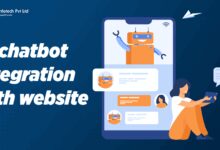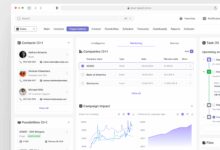AI-Powered CRM Software: 7 Revolutionary Benefits You Can’t Ignore
Imagine a CRM that doesn’t just store customer data but actually predicts what your clients want before they say it. That’s the power of AI-Powered CRM Software—transforming how businesses connect, convert, and retain customers with intelligent automation and real-time insights.
[ez-toc]
What Is AI-Powered CRM Software?

AI-Powered CRM Software refers to Customer Relationship Management systems enhanced with artificial intelligence to automate tasks, analyze customer behavior, and deliver actionable insights. Unlike traditional CRM platforms that require manual input and static reporting, AI-driven CRMs learn from data patterns, adapt to user behavior, and proactively suggest next steps.
How AI Transforms Traditional CRM Systems
Traditional CRM tools are reactive—they record interactions after they happen. AI-Powered CRM Software, on the other hand, is proactive. It uses machine learning algorithms to anticipate customer needs, recommend personalized content, and even predict churn before it occurs.
- Automated data entry and enrichment via natural language processing (NLP)
- Real-time sentiment analysis during customer interactions
- Intelligent lead scoring based on behavioral patterns
“AI doesn’t replace human intelligence in CRM—it amplifies it.” — Gartner Research, 2023
Core Components of AI in CRM
p>The integration of AI into CRM systems relies on several key technologies that work together to deliver smarter customer experiences:
- Machine Learning (ML): Learns from historical data to improve predictions over time, such as forecasting sales or identifying high-value customers.
- Natural Language Processing (NLP): Enables chatbots and voice assistants to understand and respond to customer inquiries in human-like language. For example, Salesforce Einstein uses NLP to analyze email sentiment and prioritize follow-ups.
- Predictive Analytics: Uses statistical models to forecast future outcomes, like which leads are most likely to convert. Tools like HubSpot’s AI Sales Assistant leverage this for lead prioritization.
These components allow AI-Powered CRM Software to go beyond simple automation and deliver true cognitive capabilities that enhance decision-making across sales, marketing, and service teams.
Top 7 Benefits of AI-Powered CRM Software
The shift from conventional CRM to AI-enhanced platforms brings transformative advantages. Here are seven game-changing benefits that organizations experience when adopting AI-Powered CRM Software.
1. Hyper-Personalized Customer Experiences
AI enables businesses to deliver highly personalized interactions at scale. By analyzing past purchases, browsing behavior, and communication history, AI-Powered CRM Software can tailor product recommendations, email content, and support responses to individual preferences.
- Dynamic content personalization in marketing emails using AI-driven segmentation
- Product suggestions based on real-time user behavior (e.g., Amazon-style recommendations)
- Customized onboarding journeys for new customers
For instance, companies like Netflix and Spotify use similar AI logic to keep users engaged—now, CRM platforms like Zoho CRM with Zia AI apply this to B2B and B2C customer engagement.
2. Smarter Lead Scoring and Prioritization
One of the biggest challenges in sales is knowing which leads to focus on. AI-Powered CRM Software solves this by automatically scoring leads based on engagement levels, demographic fit, and behavioral signals.
- Assigns dynamic scores that update in real time as prospects interact with your website or emails
- Identifies hidden patterns—like frequent page visits or time spent on pricing pages—as intent signals
- Reduces manual guesswork and increases conversion rates by up to 30% (source: Salesforce State of Sales Report)
This level of precision ensures sales teams spend time on high-potential opportunities, improving efficiency and ROI.
3. Predictive Sales Forecasting
AI-Powered CRM Software enhances forecasting accuracy by analyzing historical deal data, pipeline velocity, and external factors like seasonality or market trends.
- Generates predictive revenue forecasts with confidence intervals
- Flags potential deal slippage before it impacts quarterly targets
- Provides scenario modeling (e.g., “What if we close three more deals this month?”)
Platforms like Microsoft Dynamics 365 Sales use AI to offer predictive insights that help managers adjust strategies proactively rather than reactively.
4. Intelligent Automation of Routine Tasks
Repetitive administrative tasks eat up valuable time. AI-Powered CRM Software automates these, freeing up employees for higher-value work.
- Auto-logging calls, emails, and meetings into the CRM via voice-to-text and email parsing
- Scheduling follow-ups based on optimal engagement times
- Updating contact records and enriching profiles with data from LinkedIn or Clearbit
For example, Einstein Activity Capture in Salesforce automatically syncs calendar and email data, reducing manual entry by up to 60%.
5. Enhanced Customer Service with AI Chatbots
AI-powered chatbots integrated into CRM systems provide instant, 24/7 customer support while capturing valuable interaction data.
- Resolve common queries (e.g., order status, password reset) without human intervention
- Escalate complex issues to live agents with full context from previous interactions
- Learn from each conversation to improve future responses
According to a study by IBM Institute for Business Value, AI chatbots can reduce customer service costs by up to 30% while improving response times.
6. Real-Time Sentiment Analysis
Understanding how customers feel during interactions is crucial. AI-Powered CRM Software analyzes tone, word choice, and speech patterns to detect sentiment in real time.
- Alerts agents when a customer shows signs of frustration or dissatisfaction
- Guides agents with suggested responses to de-escalate tension
- Tracks brand sentiment across social media, reviews, and support tickets
This capability is especially powerful in call centers where tools like Amazon Connect with AI analytics provide live sentiment dashboards to supervisors.
7. Proactive Churn Prediction and Retention Strategies
AI doesn’t wait for customers to leave—it predicts when they might and suggests interventions.
- Identifies at-risk customers based on reduced engagement, support ticket volume, or payment delays
- Recommends retention offers (e.g., discounts, loyalty rewards)
- Triggers automated outreach campaigns via email or SMS
Companies using AI-driven churn prediction report up to a 25% reduction in customer attrition (source: McKinsey & Company).
Leading AI-Powered CRM Software Platforms in 2024
As demand for intelligent CRM solutions grows, several platforms have emerged as leaders in integrating AI seamlessly into customer management workflows.
Salesforce Einstein AI
Salesforce remains the gold standard in AI-Powered CRM Software with its Einstein AI suite. It offers predictive lead scoring, opportunity insights, and automated activity capture.
- Einstein Lead Scoring ranks prospects based on likelihood to convert
- Einstein Opportunity Insights predicts deal risks and recommends actions
- Einstein Bots enable no-code chatbot creation for service teams
Its deep integration across Sales Cloud, Service Cloud, and Marketing Cloud makes it ideal for enterprises seeking end-to-end AI capabilities. Learn more at Salesforce Einstein Overview.
HubSpot CRM with AI Features
HubSpot combines user-friendliness with powerful AI tools, making it a favorite among SMBs and growth-focused teams.
- AI-powered email writer generates personalized outreach messages in seconds
- Smart content recommendations for blog posts and landing pages
- Automated meeting summaries and action item extraction via AI notetaker
HubSpot’s AI tools are designed to reduce friction in daily operations while maintaining a human touch. Explore their AI suite here: HubSpot AI Features.
Microsoft Dynamics 365 + AI Builder
Dynamics 365 integrates seamlessly with Microsoft’s broader ecosystem, including Azure AI and Power Platform.
- AI Builder provides pre-built models for form processing, sentiment analysis, and prediction
- Predictive forecasting in Sales module helps managers anticipate revenue trends
- Integration with Teams allows AI-driven insights during live customer calls
Its strength lies in enterprise scalability and hybrid deployment options. More info: Microsoft AI Builder.
Zoho CRM with Zia AI
Zoho CRM offers one of the most cost-effective AI-Powered CRM Software solutions, especially for mid-market businesses.
- Zia AI provides voice-assisted search, lead scoring, and sales forecasting
- AI-powered workflow automation triggers actions based on behavioral triggers
- Real-time sales assistant suggests optimal times to contact leads
Zia also supports multilingual interactions, making it suitable for global teams. Visit Zoho Zia AI for details.
How AI-Powered CRM Software Improves Sales Performance
Sales teams are among the biggest beneficiaries of AI integration. From lead qualification to deal closure, AI streamlines every stage of the sales funnel.
Automated Lead Qualification and Routing
AI-Powered CRM Software evaluates incoming leads based on predefined criteria (e.g., job title, company size, engagement level) and routes them to the right sales rep or team.
- Reduces lead response time from hours to seconds
- Ensures high-intent leads are prioritized immediately
- Minimizes human bias in lead assignment
For example, Drift’s conversational AI qualifies website visitors in real time and connects them with sales reps when they show buying intent.
AI-Driven Sales Coaching
Modern AI-Powered CRM Software includes coaching tools that analyze call recordings, email tone, and meeting notes to provide feedback to sales reps.
- Identifies top-performing language patterns and shares them across the team
- Flags missed cross-sell opportunities during customer calls
- Provides personalized training recommendations based on performance gaps
Platforms like Gong and Chorus.ai integrate with CRM systems to deliver this level of insight, helping managers scale effective selling behaviors.
Next-Best-Action Recommendations
Instead of guessing what to do next, sales reps receive AI-generated suggestions tailored to each customer.
- “Send a case study about logistics solutions to Client X”
- “Follow up with a demo offer after the prospect viewed the pricing page”
- “Propose a renewal discount 14 days before contract expiration”
These recommendations are powered by deep learning models trained on thousands of successful interactions, increasing win rates and shortening sales cycles.
AI in Marketing: Supercharging Campaigns with CRM Intelligence
Marketing teams leverage AI-Powered CRM Software to create smarter, more responsive campaigns that adapt in real time to customer behavior.
Predictive Customer Segmentation
Traditional segmentation relies on static demographics. AI enables dynamic, behavior-based segmentation that evolves as customers interact with your brand.
- Clusters customers based on purchase history, content engagement, and lifecycle stage
- Identifies micro-segments for hyper-targeted messaging
- Updates segments automatically as new data flows in
This allows marketers to send the right message to the right person at the right time—boosting open rates and conversions.
Content Optimization Using AI Insights
AI analyzes which types of content perform best with different audience segments and recommends improvements.
- Suggests subject line variations to increase email open rates
- Recommends optimal send times based on recipient behavior
- Generates A/B test hypotheses for landing pages and CTAs
Tools like Persado and Phrasee use AI to craft emotionally resonant marketing copy, often outperforming human-written versions.
Automated Campaign Management
AI-Powered CRM Software can manage entire marketing campaigns autonomously, adjusting budgets, channels, and messaging based on performance.
- Shifts ad spend toward high-converting audiences in real time
- Pauses underperforming email sequences and activates backup workflows
- Triggers re-engagement campaigns for inactive subscribers
This level of automation reduces manual oversight and maximizes campaign ROI.
Customer Service Transformation Through AI
AI is revolutionizing customer service by enabling faster resolutions, proactive support, and deeper insights into customer satisfaction.
AI-Powered Virtual Agents and Chatbots
Chatbots powered by AI-Powered CRM Software handle routine inquiries, access customer history, and escalate complex issues—all within seconds.
- Available 24/7 across websites, apps, and messaging platforms
- Reduces average handling time by up to 50%
- Improves first-contact resolution rates
Intercom and Zendesk both offer AI chatbots that integrate directly with CRM data to deliver contextual support.
Sentiment-Driven Support Routing
When a customer expresses frustration, AI can detect the emotion and route the case to a senior agent or supervisor.
- Uses NLP to analyze text and voice tone for urgency and sentiment
- Attaches emotional context to service tickets for better handling
- Helps prevent escalations by addressing issues early
This leads to higher customer satisfaction (CSAT) scores and reduced churn.
Self-Service Knowledge Optimization
AI analyzes common support queries and improves knowledge base articles to answer them more effectively.
- Identifies gaps in documentation (e.g., missing troubleshooting steps)
- Ranks articles by relevance and success rate
- Suggests related articles during live chats
Over time, this reduces ticket volume and empowers customers to find answers independently.
Challenges and Ethical Considerations of AI in CRM
While AI-Powered CRM Software offers immense benefits, it also presents challenges that organizations must address responsibly.
Data Privacy and Security Risks
AI systems require vast amounts of customer data, raising concerns about privacy and compliance.
- Risk of data breaches if AI models are not properly secured
- Compliance with GDPR, CCPA, and other regulations when processing personal data
- Potential misuse of predictive analytics for manipulative marketing
Organizations must implement robust data governance policies and ensure transparency in how AI uses customer information.
Bias in AI Algorithms
AI models can inherit biases from training data, leading to unfair treatment of certain customer groups.
- Lead scoring models may favor certain demographics unintentionally
- Chatbots may misunderstand dialects or non-native speakers
- Lack of diversity in training data skews recommendations
Regular audits, diverse data sets, and explainable AI practices are essential to mitigate bias.
Over-Reliance on Automation
While automation improves efficiency, excessive reliance can erode the human touch in customer relationships.
- Customers may feel alienated by overly robotic interactions
- Loss of empathy in service when AI handles all touchpoints
- Need for balance between automation and human intervention
The goal should be augmentation, not replacement—using AI to empower human agents, not eliminate them.
Future Trends in AI-Powered CRM Software
The evolution of AI-Powered CRM Software is accelerating, driven by advances in generative AI, real-time analytics, and omnichannel integration.
Generative AI for Content Creation
Generative AI is transforming how CRM users create emails, proposals, and support responses.
- AI writes personalized sales emails in the user’s voice and tone
- Generates executive summaries from long meeting transcripts
- Creates marketing copy optimized for conversion
Tools like Jasper and Copy.ai are already integrating with CRM platforms to streamline content workflows.
Real-Time Decision Intelligence
Future CRM systems will act as AI co-pilots, offering real-time guidance during customer interactions.
- Suggests talking points during live sales calls based on customer profile
- Alerts agents to cross-sell opportunities mid-conversation
- Adjusts pricing or offers dynamically based on negotiation history
This level of intelligence will make CRM systems active participants in revenue generation.
Omnichannel AI Orchestration
AI will unify customer experiences across email, chat, phone, social media, and in-person touchpoints.
- Ensures consistent messaging and tone across all channels
- Tracks customer journey seamlessly, regardless of platform
- Delivers context-aware responses based on full interaction history
The future of AI-Powered CRM Software is not just intelligent—it’s invisible, anticipatory, and deeply integrated into every customer touchpoint.
What is AI-Powered CRM Software?
AI-Powered CRM Software is a customer relationship management system enhanced with artificial intelligence to automate tasks, analyze data, predict behaviors, and deliver personalized experiences. It goes beyond traditional CRM by learning from interactions and making intelligent recommendations.
How does AI improve lead scoring in CRM?
AI improves lead scoring by analyzing behavioral data (e.g., email opens, website visits), demographic fit, and engagement patterns to assign dynamic scores. This helps sales teams prioritize high-intent leads and increase conversion rates.
Can AI in CRM replace human sales reps?
No, AI in CRM is designed to augment, not replace, human reps. It handles repetitive tasks and provides insights, allowing sales professionals to focus on building relationships and closing deals.
Is AI-Powered CRM Software suitable for small businesses?
Yes, many AI-Powered CRM Software platforms like HubSpot and Zoho offer affordable, scalable solutions tailored for small and medium-sized businesses.
What are the risks of using AI in CRM?
Risks include data privacy concerns, algorithmic bias, over-automation leading to impersonal service, and dependency on AI without human oversight. Proper governance and ethical AI practices are essential to mitigate these risks.
The rise of AI-Powered CRM Software marks a fundamental shift in how businesses manage customer relationships. From predictive analytics and intelligent automation to personalized engagement and proactive service, AI is no longer a luxury—it’s a necessity for staying competitive. While challenges around data privacy and bias remain, the benefits far outweigh the risks when implemented responsibly. As generative AI and real-time intelligence continue to evolve, the CRM of the future will act as a true business partner, anticipating needs and driving growth. The key is to embrace AI not as a replacement for human insight, but as a powerful amplifier of it.
Recommended for you 👇
Further Reading:


